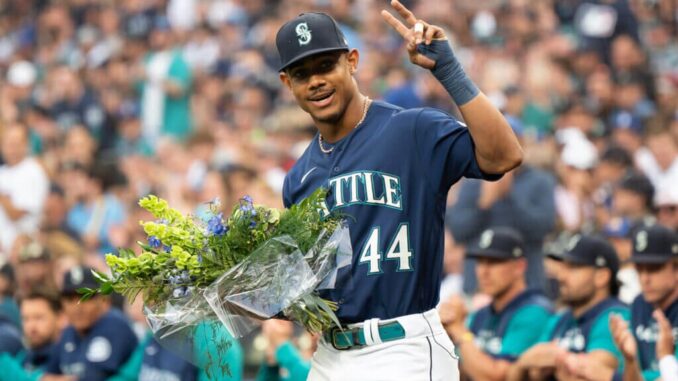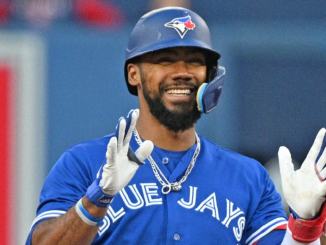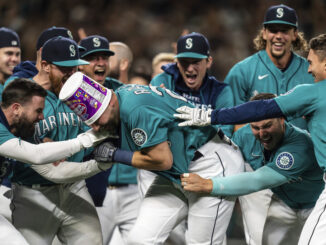
Get used to it Seattle Mariners fans, because Julio Rodriguez is here to stay for a long time.
The rookie of the year candidate, break-out star, and nationwide household name thanks to an epic performance in the home run derby at the All-Star Game, will be staying in Seattle at least through the end of the decade after Rodriguez and the Mariners agreed on a complex contract extension that guarantees him over $100 million and could rise to over $450 million when all is said and done.
In every possible way, this deal is a win-win-win. It’s a win for Rodriguez, who now guarantees himself enough money to be set for life after a meteoric rise to stardom. It’s a win for the Mariners, who negotiated a savvy deal that is team friendly and has a series of smart levers built into it, and it’s a win for the team’s fans, who now get to witness one of the most fun to watch players in baseball stay in teal at least through 2029.
The contract is a fairly complex one. At its base level, it guarantees Rodriguez $120 million through the 2029 season. That buys out his contract arbitration seasons and the first two years of free agency. Major league baseball players are eligible for salary arbitration after 2-3 years, depending on performance, where their contracts can be above the major league minimum, and eligible for free agency after five full seasons.
Signing him for seven years and $120 million is a steal in and of itself. That will ensure he stays in a Mariners uniform until just shy of his 30th birthday. It’s what comes at the end of that initial extension that makes the contract more complicated. Depending on what incentives Rodriguez meets along the way, the Mariners can exercise a team option between 8-10 years and up to $350 million. If the Mariners decline to use the team option, Rodriguez can either choose to exercise a 5-year, $90 million player option or choose to become a free agent.
If Rodriguez fulfills expectations and becomes a superstar (which he already appears well on track to do), he could very well continue to be that well into his 30s. Players with plus-plus speed, power, defense, and plate discipline don’t come along very often, and even if his defense and speed dip as he ages, similarly to Mike Trout, he could still be a solid contributor into his mid-30s and that point, anything else he adds after that would just be gravy.
On the other hand, in the worst-case scenario, injuries take a toll, or pitchers find a way to adjust to his seemingly near-perfect batting eye, and by the end of the initial extension, Rodriguez is just an average player or below-average player. At that point, he would probably look at the free agent market and decide staying in Seattle would be the best bet. Paying a below-average player $90 million over five years as they enter their 30s may seem like a bad idea. And probably right now, it would be. However, as we have all learned over the past few months with rising inflation, things today do not cost the same as they do tomorrow, or in this case, seven years from now. Even by today’s salary figures, $18 million a season in dead weight money is not a crippling figure for any franchise that is serious about fielding a competitive baseball team. By 2030 the impact of that amount will be even less meaningful.
While Rodriguez can now earn enough money to be completely set for life, the Mariners now have enough cost certainty over the next decade that they can easily afford to build a competitive roster around Rodriguez. They don’t have to worry about a ticking free agency clock or Rodriguez’s value continuing to rise. Now that they know they have a centerpiece, they can begin building around him.
The deal is also a win for Mariners fans. Over the last two generations, they have seen transcendent superstars like Randy Johnson and Ken Griffey Jr. traded away, and Alex Rodriguez depart because ownership refused to meet their contract demands. They watched the careers of Ichiro, Felix Hernandez, and Kyle Seager wasted because of the mediocre teams around them. But now the team finally appears it may be turning the corner on the field, and it may be turning the corner off it, as making sure that your team, and no one else, gets to keep the next generational superstar. By the time his career has ended, there is a good chance that Rodriguez can surpass Griffey as the most exciting player to ever wear a Mariners jersey, and with this contract signed, there is an even better chance that he will start and end his career in Seattle.




